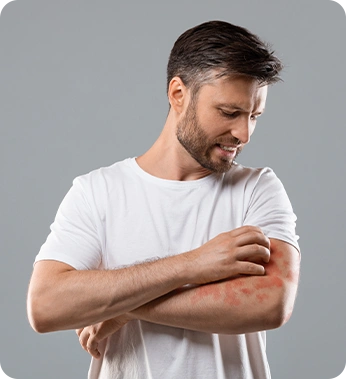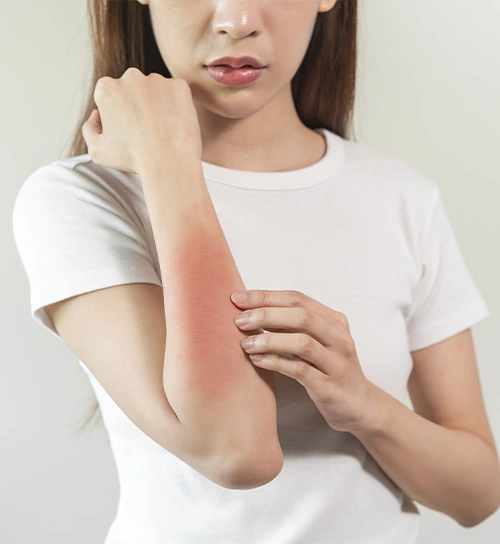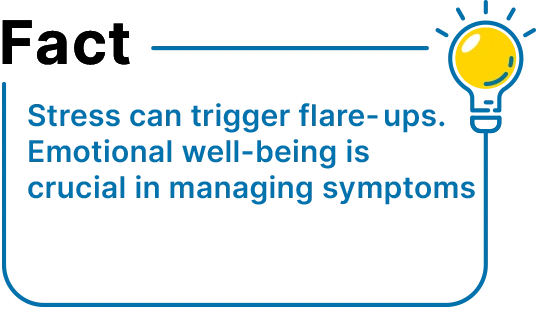Homeopathic Treatment
for Eczema
Clinically Proven, Side-Effect-Free Treatment
to Soothe & Strengthen Skin

Eczema, a chronic inflammatory skin condition, affects approximately 11.4% of India's elderly population, with prevalence increasing to 18.2% among those aged 81 and above
This condition leads to persistent itching, redness, dryness, and flaking, significantly impacting quality of life
Conventional treatments, such as topical corticosteroids and antihistamines, often provide temporary relief. However, studies indicate that 43% of patients experience flare-ups after discontinuing treatments like cyclosporine, underscoring the need for consistent, long-term management strategies
At Dr Batra’s®, we offer a holistic approach to eczema management, combining personalised homeopathic treatments with advanced skin diagnostics to address the root cause and provide lasting relief
With India’s largest team of homeopathic dermatologists, Dr Batra’s® has set the benchmark for research-backed eczema treatments. Our clinically proven homeopathic solutions go beyond symptom control—they target the root cause to provide long-lasting relief and restore healthy skin naturally
Personalised Assessments
Every patient receives a customised treatment plan after a detailed consultation and Advanced Skin Diagnostics to identify invisible skin issues
Homeopathy Combined with Advanced Aesthetics
Homeopathy targets the root cause for long-term relief, while advanced aesthetics like DermaHeal and other skin-repair therapies help restore healthy skin faster
Holistic Treatment Approach
We focus on your diet, nutrition, and skincare routine to support overall skin health and prevent flare-ups
Expertise & Experience
90%+ success rate, 200+ clinics, 300+ doctors, and 1.5 lakh+ eczema patients successfully treated globally
Measuring Progress
Regular assessments and consultations with senior doctors to track improvements and fine-tune your treatment for optimal results
At Dr Batra’s®, we combine science, homeopathy, and advanced skin treatments to heal eczema naturally and restore your skin’s health
Homeopathy is one of the safest and most effective ways to manage eczema without harsh treatments
Treats the Root Cause
Addresses immune imbalances rather than just masking symptoms
Personalised Remedies
Every patient gets a unique, tailored treatment plan
Works for All Eczema Types
Whether atopic, contact, or seborrheic eczema, homeopathy offers relief
No Dependency on Steroids
Unlike conventional treatments, homeopathy has zero withdrawal effects
Boosts Skin Immunity
Strengthens the skin’s defence against future flare-ups
Eczema requires a structured and personalised approach for lasting relief. At Dr Batra’s®, we follow a stepwise treatment plan to manage symptoms and prevent flare-ups

By treating eczema at its root, Dr Batra’s® homeopathy provides long-lasting relief and healthier skin—naturally
Dr Batra’s® Dermal Heal Treatment – A specialised homeopathic solution that soothes inflammation, repairs skin, and prevents flare-ups naturally
Soothes Itchy Skin
Relieves redness, irritation, and discomfort
Reduces Flare-Ups
Minimizes eczema triggers and prevents recurrences
Strengthens Skin Barrier
Restores hydration and prevents excessive dryness
Safe for Babies & Adults
Homeopathic medicines are suitable for all age groups
Homeopathic remedies for eczema offer long-term relief without side effects

Atopic Dermatitis
The most common form, often hereditary
Contact Dermatitis
Triggered by allergens or irritants
Seborrheic Dermatitis
Affects the scalp and oily areas
Dyshidrotic Eczema
Causes blisters on hands and feet
Nummular Eczema
Leads to coin-shaped patches of inflamed skin
Learn more about eczema types
Eczema is caused by a combination of genetic, immune, and environmental factors:
Genetic Predisposition
Runs in families with allergies
Overactive Immune Response
Triggers excessive inflammation
Environmental Factors
Exposure to irritants, chemicals, or allergens
Weather Changes
Dry or humid conditions can worsen symptoms
Stress & Hormonal Imbalances
Emotional health impacts skin conditions
Read about causes of eczema
Eczema symptoms can vary, but common signs include:
Dry, Scaly Skin
Skin becomes rough and flaky
Itching & Redness
Persistent irritation, worse at night
Swelling & Cracking
Skin may crack and bleed
Blisters & Oozing
Severe cases involve fluid-filled eruptions
Understand eczema symptoms for early diagnosis and management
Eczema symptoms can vary, but common signs include:
Graphites
Best for thick, cracked, dry, or oozing skin
Sulphur
Helps in severe itching, burning, and rednes
Rhus Toxicodendron
Works well for eczema with blisters and intense itching
Mezereum
Ideal for fluid-filled eruptions with a burning sensation
Homeopathic medicine for eczema and itchy skin is customized for every individual!
Homeopathy is the best treatment for eczema as it targets the root cause rather than just suppressing symptoms. At Dr Batra’s®, our personalised homeopathic treatments reduce inflammation, strengthen skin immunity, and prevent flare-ups—naturally and without side effects.
Common triggers include allergens (dust, pollen, pet dander), harsh soaps, stress, weather changes, certain foods, and genetic factors. Identifying and managing these triggers is key to controlling flare-ups.
Eczema is a chronic skin disorder caused by an overactive immune response, leading to inflammation, dryness, and itching. It is not contagious but requires long-term care.
Preventing eczema from spreading involves hydrating the skin, avoiding triggers, using mild skincare products, and following a personalised treatment plan like Dr Batra’s® homeopathy to strengthen skin health.
Symptoms include redness, dryness, itching, inflammation, cracked or scaly skin, and in severe cases, fluid-filled blisters. Symptoms vary based on severity and triggers.
Yes, if left untreated, eczema can spread to other parts of the body due to scratching, infections, or worsening inflammation. Proper treatment helps contain and control flare-ups.
Yes, persistent itching could indicate eczema, allergies, fungal infections, liver or kidney issues, or even diabetes. If itching persists, a professional consultation is recommended.
Dairy, gluten, nuts, soy, eggs, and processed foods can trigger eczema flare-ups in sensitive individuals. Identifying and avoiding food allergens can help reduce symptoms.
Common allergens include dust mites, pollen, pet dander, mold, and certain foods. Skin reactions like eczema can result from immune system hypersensitivity.
Eczema can be effectively managed but has no permanent cure. Homeopathy helps control symptoms, prevent flare-ups, and improve skin health for long-term relief.
Eczema stems from a combination of genetic, immune, and environmental factors. A hyperactive immune system causes inflammation, leading to skin irritation and sensitivity.
No, eczema is an inflammatory skin condition, not a fungal infection. However, untreated eczema can lead to secondary infections, including fungal or bacterial overgrowth.
Eczema is not an immune deficiency but results from an overactive immune response, leading to inflammation and skin barrier dysfunction. Strengthening immunity helps manage symptoms.